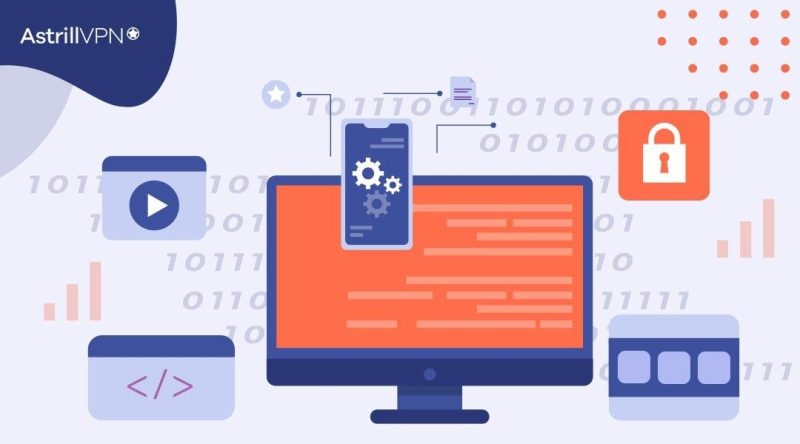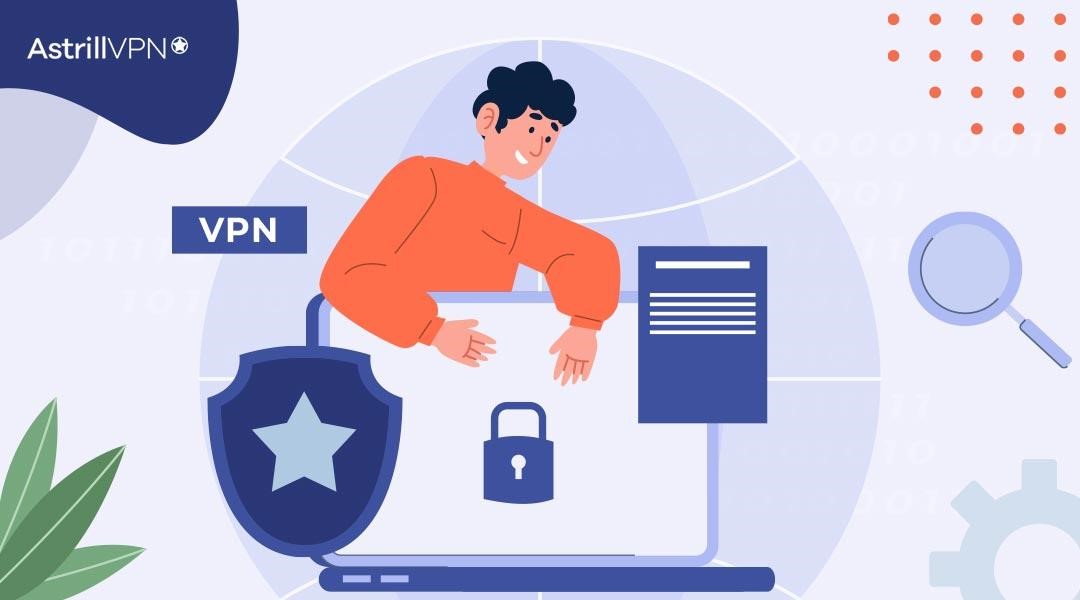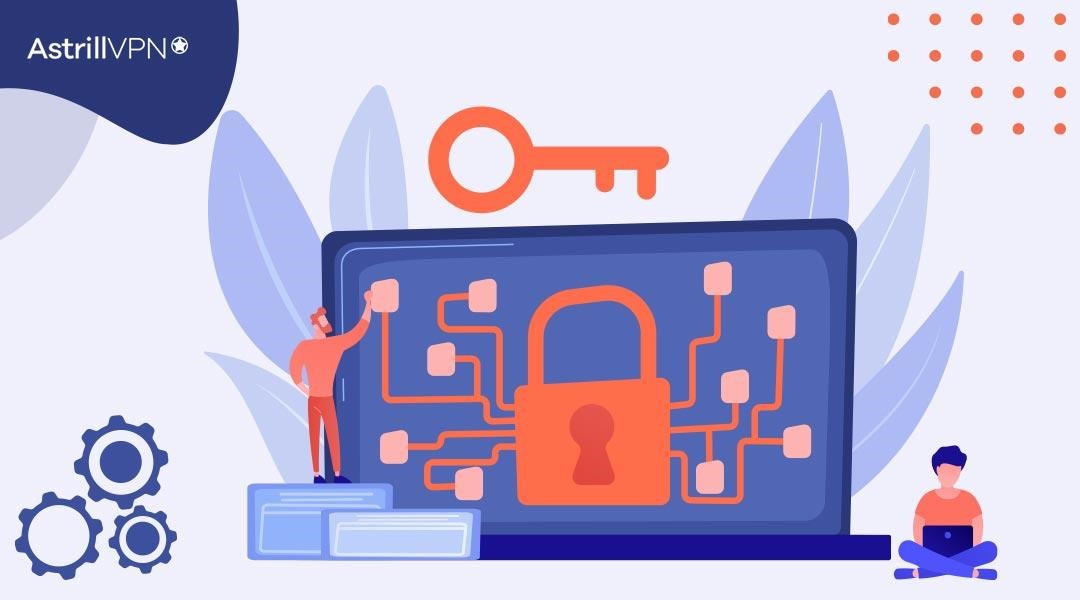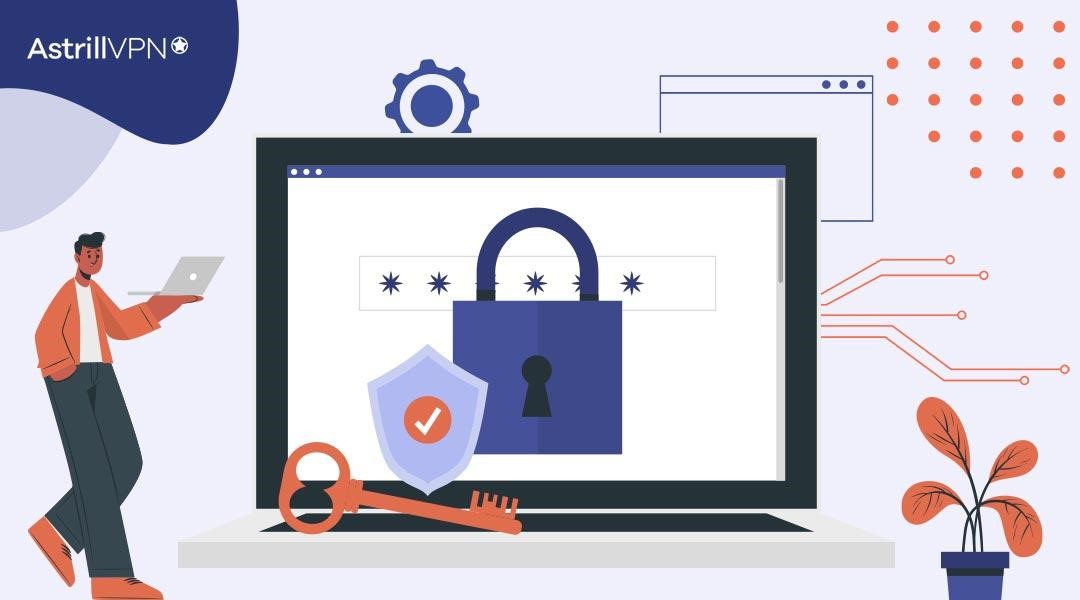VPN Encryption Explained: How Does it Work?

Arsalan Rathore

Encryption serves as a powerful tool to safeguard sensitive information from unauthorized access and maintain confidentiality. In this guide, we have explained VPN encryption in detail and discussed the types of protocols you may come across.
So without further ado, let’s dive right into VPN encryption and understand what it is and what it is used for:
Table of Contents
How does VPN encryption work?

Does VPN encrypt data? Yes, it does; that’s the way it conceals users’ details. Now the question is how this VPN encryption works?
VPN encryption works by employing various encryption algorithms and secure tunneling techniques to protect your online activities. When you connect to a fast VPN, your device establishes a secure connection with the VPN server.
This connection setup involves negotiating encryption parameters and agreeing on the encryption algorithms to be used. Once the VPN connection is established, your data is encrypted before transmission. Encryption algorithms, such as AES (Advanced Encryption Standard), transform your original data (plaintext) into an unreadable format (ciphertext). These algorithms utilize encryption keys, which can be either symmetric or asymmetric.
In symmetric encryption, the same key is used for both encryption and decryption, and it is securely shared between your device and the VPN server during the connection setup. Asymmetric encryption uses a pair of mathematically related keys: public and private keys. The public key is freely shared, while the private key remains securely stored on your device.
To ensure the confidentiality and integrity of your data, VPNs employ a technique called tunneling. Your VPN encrypted data is encapsulated within an additional layer of security, forming a secure tunnel between your device and the VPN server. This VPN tunnel encryption prevents unauthorized parties from intercepting or tampering with your data as it travels across the internet.
The encrypted data is transmitted through this secure tunnel to the VPN server. Upon arrival, the VPN server decrypts the data using the appropriate decryption keys.
Types of VPN Encryption
There are two main VPN encryption types:
1. Symmetric key encryption

Symmetric key encryption, also known as secret key encryption, is a form of encryption where the same key is used for both the encryption and decryption processes. This means that the sender and receiver must share the same secret key beforehand.
The encryption process takes the original plaintext and transforms it into ciphertext using the secret key. The receiver, in possession of the same key, can then decrypt the ciphertext and retrieve the original plaintext.
The main advantage of symmetric key encryption is its efficiency and speed. Symmetric encryption algorithms are designed to process large amounts of data quickly. Some popular symmetric encryption algorithms include Advanced Encryption Standard (AES), Data Encryption Standard (DES), and Triple DES (3DES). These algorithms use complex mathematical operations to scramble the plaintext and make it unreadable without the key.
However, a significant challenge in symmetric key encryption is securely sharing the secret key between the sender and receiver. If an unauthorized party gains access to the key, it can decrypt the ciphertext and access the sensitive information. To address this issue, key distribution mechanisms such as key exchange protocols or pre-shared keys are used to securely transmit the secret key.
2. Asymmetric encryption

Asymmetric encryption, also known as public key encryption, is a type of encryption that uses a pair of mathematically related keys: a public key and a private key. These keys are generated simultaneously, and while the public key is freely shared with others, the private key is kept secret and known only to the owner.
The encryption process with asymmetric encryption involves using the recipient’s public key to encrypt the plaintext and generate the ciphertext. Once encrypted, only the recipient possessing the corresponding private key can decrypt the ciphertext and retrieve the original plaintext. This ensures that only the intended recipient can access the decrypted message.
Asymmetric encryption provides several advantages over symmetric encryption, primarily in terms of key distribution and authentication. Since the public key can be freely shared, it eliminates the need for a secure key exchange mechanism.
Additionally, asymmetric encryption enables digital signatures and authentication, as the sender can encrypt a message with their private key, allowing the receiver to verify the integrity and authenticity of the message using the sender’s public key.
Commonly used asymmetric encryption algorithms include RSA (Rivest-Shamir-Adleman) and Elliptic Curve Cryptography (ECC). These algorithms are computationally intensive, making them slower compared to symmetric encryption algorithms. Therefore, asymmetric encryption is typically used for exchanging symmetric keys securely rather than encrypting large amounts of data directly.
Benefits of Using an Encrypted VPN
● Privacy Protection
A VPN offers enhanced privacy protection by encrypting your internet traffic and masking your IP address. It prevents your ISP, government agencies, or malicious actors from monitoring your online activities, safeguarding your privacy. AstrillVPN uses military-grade 256-bit AES encryption for maximum privacy and security.
● Security Enhancement
Using a VPN adds an extra layer of security to your online connections. VPN encryption ensures that any data transmitted between your device and the VPN server is protected from interception or tampering by unauthorized parties. This is particularly vital when using public Wi-Fi networks, where the risk of data interception is higher.
● Access to Restricted Content
A VPN allows you to bypass geographical restrictions and access content that may be blocked or censored in your location. By connecting to an AstrillVPN server in a different country, you can appear as if you are browsing from that location, enabling access to region-specific content or services.
Are all VPNs encrypted?
While VPNs are designed to encrypt your internet traffic and protect your data, the specific encryption protocols and algorithms used can vary between different VPN service providers. It’s important to choose a reputable VPN service that employs strong encryption to ensure the security and privacy of your online activities.
It’s worth noting that not all VPNs prioritize encryption equally. Some free or less reputable VPN services may use weaker encryption methods or even compromise on encryption to prioritize other factors such as speed or cost-effectiveness. Therefore, it is essential to conduct thorough research and choose a VPN provider that places a high emphasis on encryption and security.
VPN Encryption Protocols: Pros & Cons
| VPN Encryption Protocols | Pros | Cons |
| OpenVPN | OpenVPN is known as one of the best VPN encryption protocols, for its robust encryption and security measures. It uses OpenSSL library and supports various encryption algorithms like AES, Blowfish, and more. | Due to its robust encryption and the overhead of encapsulating data in additional layers, OpenVPN can sometimes be slower compared to other protocols. |
| IPsec | IPsec provides strong encryption and authentication mechanisms, ensuring secure communication. It supports multiple encryption algorithms and authentication methods. | Setting up IPsec VPNs can be more complex compared to other protocols. It requires proper configuration of policies, keys, and parameters. |
| WireGuard | WireGuard is designed to be simple, efficient, and performant. It utilizes state-of-the-art cryptography, making it lightweight and faster than many other protocols. | WireGuard is a relatively new protocol, and while it has gained popularity, it is still being audited and further developed |
| SSTP | SSTP leverages the widely adopted SSL/TLS protocol, providing strong encryption for VPN traffic. It uses port 443, making it less likely to be blocked by firewalls or network restrictions. | SSTP is primarily supported on Windows devices. While it may work with third-party clients on other platforms, it may not be as widely available as other protocols. |
| StealthVPN | StealthVPN is specifically designed to bypass deep packet inspection (DPI) and VPN blocking techniques. It disguises VPN traffic as regular HTTPS traffic, making it difficult for network administrators or ISPs to detect and block the VPN. | Due to the obfuscation techniques used, StealthVPN may introduce a slight performance overhead compared to other protocols. |
What encryption protocols do VPNs use?
VPNs use various encryption protocols to protect your online data from prying eyes. These protocols act as shields, scrambling your data into a format only your device and the VPN server can understand.
Here’s a more detailed breakdown of the most common VPN encryption protocols:
AES (Advanced Encryption Standard)
AES, or Advanced Encryption Standard, is a symmetric block cipher that has become the gold standard for data encryption. It operates by encrypting data in fixed-size blocks of 128 bits, using a key length of either 128, 192, or 256 bits.
The encryption process involves multiple rounds of substitution, permutation, and mixing of the plaintext with the encryption key. The number of these rounds increases with the key size—10 rounds for 128-bit keys, 12 for 192-bit keys, and 14 for 256-bit keys. AES is renowned for its combination of security and efficiency.
The 256-bit key version is particularly secure and is trusted by governments, military organizations, and financial institutions worldwide. In the context of VPNs, AES is widely used across various protocols such as OpenVPN, IPsec, and IKEv2, primarily due to its strong encryption and resistance to all known practical attacks.
Its ability to provide robust security without compromising performance makes it the preferred choice for most VPN providers including AstrillVPN.
Blowfish
Blowfish is a symmetric block cipher known for its speed and flexibility. It encrypts data in 64-bit blocks, smaller than AES’s 128-bit blocks, and can use variable key lengths ranging from 32 to 448 bits, with 128-bit keys being most common. Blowfish employs a series of transformations, including substitution and permutation, to scramble the input data, making it difficult to decrypt without the correct key.
While Blowfish was designed as a faster alternative to older encryption algorithms like DES, it has some limitations. Its 64-bit block size, for instance, makes it vulnerable to certain types of attacks, such as birthday attacks, especially when large volumes of data are encrypted under the same key.
Although Blowfish remains secure for many applications, it has largely been replaced by AES in modern systems due to AES’s larger block size and better performance on contemporary hardware.
In the VPN context, Blowfish is occasionally used in older OpenVPN implementations, but its use is declining as newer, more secure algorithms become standard.
3DES (Triple Data Encryption Standard)
3DES, or Triple Data Encryption Standard, is an encryption algorithm that enhances the security of the original DES by applying the encryption process three times to each data block. This method involves using either two or three different 56-bit keys, effectively resulting in a 168-bit key length in the most secure implementation.
The process encrypts the data with the first key, decrypts it with the second key, and then encrypts it again with the third key (or the first key in a two-key setup). While 3DES was once a widely used encryption method, providing stronger security than DES, it is now considered outdated and inefficient.
It is relatively slow compared to modern algorithms like AES, and its smaller block size (64 bits) makes it less secure in the face of modern cryptographic attacks. Despite these limitations, 3DES is still found in some legacy systems and older IPsec implementations. However, it is being phased out in favor of more secure and faster alternatives like AES.
ChaCha20
ChaCha20 is a symmetric stream cipher that has gained popularity for its speed and security, particularly in environments where hardware acceleration for AES is not available, such as on many mobile devices. Unlike block ciphers that encrypt data in fixed-size blocks, stream ciphers like ChaCha20 encrypt data one bit at a time, generating a key stream that is combined with the plaintext to produce ciphertext.
ChaCha20 uses a 256-bit key and 20 rounds of encryption to ensure data security. One of its key strengths is its resistance to timing attacks, which makes it particularly well-suited for software implementations where performance and security are critical.
In VPNs, ChaCha20 is often used in modern protocols like WireGuard and as an alternative to AES in certain OpenVPN configurations. Its efficiency and security make it an attractive choice for securing data on resource-constrained devices.
RSA (Rivest-Shamir-Adleman)
RSA is a widely used asymmetric encryption algorithm that plays a crucial role in securing data communications, particularly for key exchange and digital signatures. It relies on a pair of keys: a public key for encryption and a private key for decryption.
The security of RSA is based on the mathematical difficulty of factoring large prime numbers, making it a robust method for ensuring that only the intended recipient can decrypt the data. RSA typically uses key sizes of 2048 bits or 4096 bits, with the latter providing even greater security.
ECC (Elliptic Curve Cryptography)
Elliptic Curve Cryptography (ECC) is an asymmetric encryption algorithm that offers strong security with smaller key sizes, making it more efficient than traditional algorithms like RSA. ECC is based on the mathematics of elliptic curves, and its security derives from the difficulty of solving the elliptic curve discrete logarithm problem.
For example, a 256-bit ECC key provides a level of security comparable to a 3072-bit RSA key, but with much lower computational overhead. This efficiency makes ECC particularly well-suited for environments where processing power, memory, and bandwidth are limited, such as on mobile devices or embedded systems.
HMAC (Hash-Based Message Authentication Code)
HMAC is a mechanism that combines a cryptographic hash function with a secret key to produce a message authentication code, ensuring the integrity and authenticity of a message.
The HMAC process involves applying the hash function to the message data along with the secret key, generating a unique code that can be used to verify that the message has not been altered and that it originates from a trusted source. HMAC is highly secure, particularly when used with strong hash functions like SHA-256, and is resistant to common cryptographic attacks such as collision and length-extension attacks.
SHA (Secure Hash Algorithm)
The Secure Hash Algorithm (SHA) family consists of cryptographic hash functions designed to ensure data integrity by producing a fixed-size hash value, or digest, from an arbitrary amount of input data.
The most commonly used versions in VPNs are SHA-1 and the more secure SHA-2 variants, including SHA-256 and SHA-512. SHA works by processing the input data through a series of transformations, generating a hash value that is unique to the specific input.
Even a small change in the input data results in a completely different hash value, making SHA an effective tool for verifying data integrity. SHA-2, particularly SHA-256 and SHA-512, is widely used for its strong security, as it is resistant to collisions, where two different inputs produce the same hash.
In VPNs, SHA functions are used in conjunction with HMAC for message authentication and in digital signatures to ensure the authenticity and integrity of data transmitted over the network. SHA-1, while still used in some legacy systems, is being phased out due to vulnerabilities, with SHA-2 now being the preferred choice for secure hashing.
Relationship between VPN protocols and Encryption?
VPN protocols and encryption are closely intertwined. Encryption is securing data by converting it into an unreadable format, while VPN protocols define the rules and procedures for establishing and maintaining a VPN connection.
VPN protocols encompass various aspects, including authentication, key exchange, and data encapsulation. These protocols work hand-in-hand with encryption algorithms to ensure secure and private communication between your device and the VPN server.
Different VPN protocols may offer varying levels of encryption and security. Choosing a VPN service that implements robust encryption and employs well-regarded protocols to safeguard your data is crucial.
How to check if your VPN is encrypted
To verify if your encrypted VPN connection is established properly, you can perform the following checks:
- When visiting websites, ensure the URL starts with “https” instead of “http.” The “https” indicates a secure, encrypted connection.
- Perform DNS leak tests and IP leak tests to ensure your VPN is not leaking sensitive information. There are online tools available that can help you verify if your VPN is properly protecting your DNS queries and IP address.
- Review the documentation provided by your VPN provider. Look for information on the encryption protocols and algorithms they use and their commitment to privacy and data protection.
- Advanced users can employ network monitoring tools to inspect the traffic between their devices and the VPN server. You can verify if the traffic is encrypted by analyzing the packets exchanged.
Can I choose the level of encryption used by my VPN?
The level of encryption used by a VPN is typically determined by the VPN service provider. Users generally do not have the option to directly choose the encryption level. Reputable VPN providers select secure encryption protocols and algorithms to ensure the highest level of protection for their users.
Can I choose the level of encryption used by my VPN?
The level of encryption used by a VPN is typically determined by the VPN service provider. Users generally do not have the option to directly choose the encryption level. Reputable VPN providers select secure encryption protocols and algorithms to ensure the highest level of protection for their users.
Conclusion
VPN encryption is the cornerstone of online privacy and security. Through the utilization of symmetric and asymmetric encryption algorithms, VPNs create a secure encryption tunnel for our internet traffic, shielding it from prying eyes.
By understanding the various VPN encryption protocols and their pros and cons, we can make informed decisions when choosing a VPN service. Moreover, ensuring that our VPN is properly encrypted through simple checks empowers us to take control of our digital security.
Faqs:
Commonly used encryption protocols in VPNs include OpenVPN, IPsec (Internet Protocol Security), WireGuard, and SSTP (Secure Socket Tunneling Protocol).
While often used interchangeably, VPNs and encryption play distinct yet complementary roles in safeguarding online privacy and security.
Encryption transforms data into a coded format that is unintelligible to unauthorized parties. It’s like scrambling a message into a secret code. When you encrypt data, you’re essentially locking it away, making it inaccessible to anyone without the correct decryption key.
This is akin to securing a treasure chest with a complex lock. Encryption protects sensitive information such as passwords, credit card numbers, and personal data. There are various encryption algorithms, each with its strengths and weaknesses.
Conversely, a VPN creates a secure, private connection between your device and the internet. It acts as a tunnel, shielding your online activities from prying eyes. Think of it as a private, underground passageway only you and the VPN server can access.
By routing your internet traffic through this secure tunnel, a VPN masks your IP address, making it difficult for websites and online trackers to identify your location. It also encrypts your data, preventing it from being intercepted and snooped.
AES (Advanced Encryption Standard) is a widely adopted symmetric encryption algorithm used in VPNs. It is known for its strong security and is commonly used to encrypt data in transit.
While no encryption is completely impervious, reputable VPN services use strong encryption methods that are highly resistant to being broken.
The use of encryption in a VPN can introduce some overhead and may potentially result in a slight decrease in internet speed.

No comments were posted yet